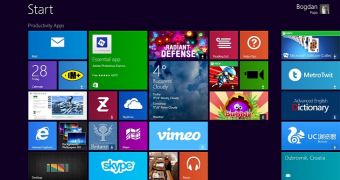Microsoft might at some point offer users a free version of Windows, if new reports pointing to a testing build of such an operating system are indeed accurate.
Mary Jo Foley of ZDNet is reporting that Windows 8.1 with Bing, a new SKU that got leaked to the web recently, could be one of the builds that might be offered free of charge to users in the coming years.
While everything sounds like it’s all just milk and honey for Windows users, there is a catch and many people might not be pleased with it.
As you could easily guess by simply reading the name of this particular SKU, it might be delivered with Bing branding and, although changes are said to be only minor as compared to a traditional version of the operating system, Microsoft might actually try to offer Bing incentives for users and OEMs in order to keep the product free of charge.
In other words, Windows 8.1 with Bing, which is actually the only build of the operating system that has chances to be offered free of charge, could come with advertisements and other promos, which is clearly not the best options for end users out there and companies looking for a clean platform that would maximize productivity.
The idea of offering Windows with ads isn’t new however and, according to some previous reports, Microsoft started thinking about it before the launch of Windows 8.
Bing Smart Search is basically the living proof that Windows 8.1 could at some point get ads, as this particular feature can look for links and information online, while also displaying advertisements on any kind of device, including tablets and PCs.
At this point, Microsoft has nothing to comment on plans to offer Windows for free, but the company is already releasing major updates for the operating system at no cost. Windows 8.1, for example, came with a freeware license for all those running Windows 8, while Windows 8.1 Update 1, a major update coming this spring, is also expected to be offered free of charge to users.
The company however will continue to monetize Windows in the traditional way every time a new major release hits the market, which means that making the move to Windows 9, for example, would also require you to pay for a license.
Of course, no confirmed information is available right now, so expect Microsoft to share more on its future plans in the coming months, as Windows 8.1 Update 1 is projected to hit the market in April.

 14 DAY TRIAL //
14 DAY TRIAL //